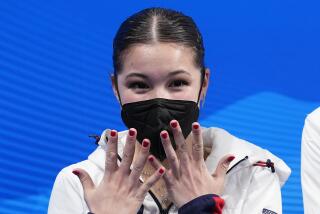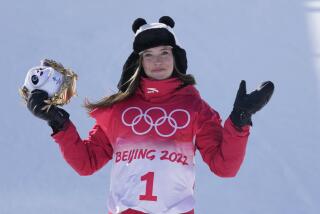China feels the pain of its Olympic star
- Share via
BEIJING — China’s “Flying Man” is now its “Achilles.”
In the moments after China watched Liu Xiang, its most popular Olympic athlete, limp away from the Games on Monday, grimacing with an injury, a reporter for the state-run television stood on the floor of the National Stadium and choked back tears.
Liu’s exit shocked the country like no Olympic moment so far. His performance in the 110-meter hurdles was to have been a soaring moment in a national event decades in the making. Even as it racked up more gold medals than ever before, China pinned its national expectations on Liu, a Chinese sprinter of unprecedented gifts, to personify the triumph over China’s deep-seated insecurity about its respect on the world stage.
Instead, the 25-year-old left a tearful nation struggling to understand what went wrong.
“He is still the king in our hearts,” reporter Dong Ernan said into the camera. Broadcasting to hundreds of millions of Chinese viewers, the station’s hosts invoked the ancient Greek known in Chinese as Ah-ke-liu-si, “a hero who also could not stand the pain in his heel.”
It was an appropriate parable for Liu, the defending Olympic gold medalist in the 110-meter hurdles, who left the track during the first heat of his event because of an injured Achilles tendon.
More than any other athlete -- even more than Yao Ming, an NBA professional who lives most of the year abroad -- Liu’s rise from international obscurity four years ago to a gold medal in Athens, and then movie-star status, had come to embody China’s national aspirations for the Games and its intention to outperform wealthier, more established sports powers.
His withdrawal triggered soul-searching among Chinese fans who wondered whether they had placed too much pressure on a single athlete, and among sports experts, who asked how his injury could have been prevented.
The nation’s official image-makers also moved swiftly to shore up pride in China’s Olympic performance and defuse disappointment. A television anchor advised viewers that “the best way to comfort and support Liu Xiang is to continue to watch and support the other Olympic competitions.”
Liu was the only Chinese athlete considered a contender for a gold medal in track and field in Beijing. Since winning his gold in Athens -- which he called, at the time, “a modest miracle for the yellow-skinned Chinese people and the Asian people” -- Liu had racked up endorsement contracts worth an estimated $20 million or more.
The son of a truck driver and groomed to run track since age 9, Liu was dubbed the Flying Man, and his image was slapped on buses, billboards and television advertisements from Beijing to the farthest reaches of China’s west.
Liu had been dealing with a hamstring problem that forced him to pull out of a meet in New York on May 31. He had been training in seclusion since and dodging public appearances as anticipation built. Some newspaper commentaries had suggested that if Liu failed in Beijing, it would undermine his previous accomplishments.
The showdown was expected to come Thursday in the final of the 110-meter hurdles, when Liu would probably have faced Cuba’s Dayron Robles, 21, who beat Liu’s world record in the event this year.
But trouble emerged Sunday when Liu’s official website posted news that “an inflamed Achilles tendon” had forced him to skip training Sunday and that his coach, Sun Haiping, worried about his fitness to run in the final.
Liu nevertheless emerged on the track Monday, wincing and massaging his right calf and foot. He settled into the blocks, but after another runner made a false start, Liu pulled off his number and left the track.
At a news conference afterward, the tearful Sun said a long-standing right foot injury had worsened recently. Three doctors had examined Liu in the run-up to the competition, he added, but Liu had intended to run.
“Liu Xiang persisted, but he honestly had no way to go on because the injury was right at the point of impact on his foot,” Sun said, before being overcome with emotion.
Liu’s injury quickly became enveloped in the vocabulary of national tragedy, not athletic competition. Signing off its live coverage, a state-television host said, “Liu Xiang, our message to you is this: We will forever be with you.”
That kind of public emotional response was unusual in Chinese media until recently, and it has not been seen since the Sichuan earthquake in May killed tens of thousands of people. In that event, reporters wept on the air and screens were adorned with the logo “Unite as One.” The experience came to be viewed by the Chinese people as a rare moment of public empathy in a nation unaccustomed to emotional outpourings for those who are not political leaders.
That collective empathy was visible once again in the response to Liu’s withdrawal, said Yin Hong, a professor of communications at Beijing’s Tsinghua University.
“Since the earthquake, the media have seemed to discover the value of the individual and the value of life in communicating with the public,” Yin said. “The public also developed a shared consciousness and a sympathetic response. That is different from a simple sense of nationalism.”
Liu’s injury was grimly understandable to those familiar with the intensity of China’s elite athletics, in which training methods have advanced faster than sports medicine practices.
“Top Chinese athletes do not use ice and do not tape. Sports nutrition is nowhere. On certain levels, China is on equal footing with the West, and we see that in the gold medal battle. But they are not going to reach their full potential until they master sports medicine,” said Terry Rhoads, managing director of Shanghai-based sports specialist Zou Marketing.
Chinese athletes are familiar with the problem.
Sun Haifang, a gold-medal-winning shooter and longtime coach, said this year: “In the U.S., athletes can train on their own schedules, but in China, because you are part of the system, you train very hard. The benefit is that you make rapid progress, but your athletic career is shorter. In the West, an athlete might keep competing into the 30s and 40s, but not in China.”
Public reaction to Liu’s withdrawal varied -- “Liu Xiang took us to heaven and now he has taken us to hell,” said one online commentator -- but overall it was overwhelmingly supportive. An online poll posted after he pulled out attracted more than 45,000 respondents within three hours; nearly three-quarters said they still “considered Liu Xiang the ‘Flying Man.’ ”
Nowhere were people as heartbroken as in Shanghai, Liu’s hometown. By late morning it seemed that everybody had seen or heard the bad news and was openly emotional.
“I was so very sorry,” said a 46-year-old policeman who gave his surname as Shen. He watched Liu’s performance in the morning before putting on his uniform and helmet. Throughout the day, Shen said, he tried to stay focused on his work but acknowledged that he carried an ache in his heart. “It’s OK,” Shen added of Liu’s pullout. “He’s still a hero.”
For many younger people in Shanghai, the nation’s commercial hub, Liu was a role model, his handsome, angular face, outgoing personality and enviably marketable status personifying a confident and youthful China.
Guo Xinlin, 21, a college student majoring in environmental studies, had followed Liu since he won the gold medal.
“I feel we gave him too much pressure,” she said, stopping for a moment on a downtown street where billboards are adorned with Liu’s image. “People had too much expectation of him.”
--
Chicago Tribune staff writer Evan Osnos reported from Beijing and Times staff writer Don Lee from Shanghai. Researcher Xu Wan in Beijing contributed to this report.
More to Read
Go beyond the scoreboard
Get the latest on L.A.'s teams in the daily Sports Report newsletter.
You may occasionally receive promotional content from the Los Angeles Times.







